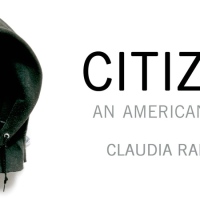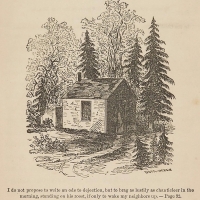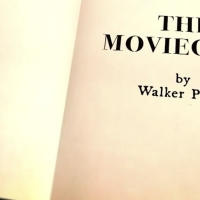In the epilogue of The Moviegoer, Binx concludes to the reader that he does not have much to say on the topic of his “search”.
The search for meaning was an important part of the novel. Throughout it, he consistently tries to escape falling into a trap of malaise.To abandon the search means that something has changed within him.
However, what has changed? Did he fail to find meaning in his life? Was he successful in his endeavors?
To answer this, we must dive into the subject of existentialism noted by Kierkegaard.
In terms of progress through the existential stages, Binx was in the aesthetic stage for most of the text.
This stage is highlighted by the manipulation of those around him in order to seek interesting conclusions in his own mind. This is seen in the way that Binx treats those that he converses with throughout the novel. It is shown more abundantly in the way he treats Sharon. In the beginning, he acts simply like an employer should act around his secretary. However, in the inner workings of his own mind, he is engineering the possibility of seducing her and how to manipulate her into falling for him. This only for him to get bored of her, indulging in other possibilities. This can be seen when he states,
If only I could send Sharon on her way and go straight upstairs and see Joyce, a total stranger? Yes. But not quite. If only I could be with both of them, with a house full of them… (123)
Showing that he cares more about the possibility for seduction rather than the actual act of it. Furthermore, once Binx fully has what he wants, he eventually does away with it due to his need to avoid commitment and responsibility.
He would rather live in a fantasy than deal with actual affairs, which is why he enjoys going to see movies. He sees them as more real than his actual life.
Later on, we see Binx reach a new height of development. He approaches the ethical stage.
It is important to note that Binx does show promise in these aspects in the beginning of the novel with how he regards his aunt. He listens to her, knowing that it is expected of him to help his step-cousin, Kate, out of her manic depression.
This is short-lived due to the fact that Binx concerns himself with his own search rather than helping Kate.
Despite that, he later approaches this stage again due to Kate’s suicide attempt. He discovers that he does, in fact, love her. This love is not a fleeting sort, like the secretaries of his past. He chooses to marry her, even going as far as to promise to stand by her side and reassure her that he loves her when Kate reveals that,
I am frightened when I am alone and I am frightened when I am with people. The only time I am not frightened is when I’m with you. You’ll have to be with me a great deal. (234)
He fulfills his promise, as seen in the epilogue. He treats her with love, having no ulterior motives that we had seen previously during his aesthetic stage of development.
The third stage of existentialism as cited by Kierkegaard is finding religion.
First, a quick examination of the day he decided to refocus his life by marrying Kate.
He makes a major change in his life on Ash Wednesday, which is shown when Binx sees a man step out of church with ash on his forehead. This marks this as the day that Binx decided what he will do for the rest of his life, foreshadowing that he will come to accept religion.
Further evidence suggests that he has found religion with how he relates to his family. This is in reference to Binx stating that,
As for my search, I have not the inclination to say much on the subject. For one thing, I have not the authority, as the great Danish philosopher declared, to speak of such matters in any way other than the edifying. For another thing, it is not open to me even to be edifying, since the time is later than his, much too late to edify or do much of anything except plant a foot in the right place as opportunity presents itself – if indeed asskicking is properly distinguished from edification. Further: I am a member of my mother’s family after all and so naturally shy away from the subject of religion (a peculiar word this is in the first place, religion; it is something to be suspicious of). (237)
This statement strongly suggests that he has accepted religion. He is a member of his mother’s family, who are practicing Catholics. He may be “shying away” from the subject, but that does not mean he has not come to accept religion. Rather, he is stating that he is similar to his family in the way that they worship.
He has found the solution to his existence to be outside of himself.
By rejecting his self-imposed loneliness, accepting love from those who care about him, and serving others, Binx finds meaning in the everyday.
End note:
Percy, Walker. The Moviegoer. Random House, Inc., 1961. p. 123, 234, 237.









I find it hard to believe that Binx truly loves Kate. For one, when he sits on the beach on page 229 and calls to speak to Sharon. After finding out that she is engaged to the man that he saw the day they worked late (Or so I assume it is he) he begins to speak to Joyce in a flirtatious manner until Kate pulls up. He does mention sensing the uneasiness of the phone call until he mentions Kate is his fiancée. Moments before then, he was also complaining about wanting a woman companion because of the speech he got from Aunt Em and the fact that he had been waiting on Kate for fifty minutes (228). Why do you feel and believe that he loves Kate over all the others? Do you think it is because the bond the two of them share, or do you think it is because she needs him as support?
As for him finding religion, It seems like he has not fully grasped that part of himself, but I do see what you mean. He can be Catholic, but not devoted and open with fully discussing the topic. Something like him finding his footing in his religion before speaking on it, similar to us doing research on topics we want to learn more about?
Do you think him finding the meaning to living everyday clears him of the malaise? Is that what his search brings him to for you? Him never going prolong periods dealing with the heavy weight from the redundancy of life or depression from repetition?
I enjoyed your post, very informative and makes me want to dive deeper to see the text the way you did.
LikeLike
Great question! I feel like the reason for him not outwardly showing his love for Kate is due to the fact that he fears commitment. This fear is caused by his want not to fall into the boredom of the everyday. He fears that if he is stuck doing the same thing, his life will have no meaning. His interest and chasing other women are a major component of that aspect of him.
Now that I have given some background regarding this, I will answer your question. In the text, it is shown how he treats Sharon and Joyce. He sees them, for the most part, as an object of desire. They are only to be conquered to him. With Kate, however, we see another side of Binx. Binx does not constantly think about Kate as a sexual object. He sees her as someone that he cares for intensely. Part of that is because of the bond that they share. They can be there for each other and understand how their depression feels. Binx stays there for her, supporting and helping her, without even thinking or wanting to make sure she’s okay. This is seen in the epilogue, when he shows concern for her when she is sad, thinking she is beautiful, and more importantly watching her as she goes off to complete the task that she has been given. We do not see any ulterior motives, showing that ultimately he loves her and is able to commit to her.
I believe that he feels uneasy speaking of religion due to the fact that he has not always been Catholic. For a short period of time, he was primarily atheist. He does not feel like he has the right to “edify” anything, since at one point, he was once lost in his search without even thinking of the possibility of God. It is not simply researching a topic, but it is the fact that he still doubts himself for the things he has done and believed in the past. This is all my personal thoughts on this. He may just feel that he needs to research more into it, like you said previously.
With there is life, there will always be malaise. A person cannot go through life without the feeling of sinking into the everyday. These feelings may come and go, lasting for a short period of time or even years. The real meaning, in my opinion, is learning to love your life despite the everydayness. His search for that, I believe, was achieved when he decided to marry Kate. He seems more happy in general, no longer seeking confirmation for his existence elsewhere. As someone who has depression, I will not say that those feelings never come back. He just discovers a way to overcome it when those feeling arise again, which is what this search has brought him to. Religion, Kate, his life is now gives him comfort by being a support system when he falls back down.
Thank you for replying to my post! I really loved your questions and concerns about the text. By telling me your thoughts on it, you gave me a lot to think about and form a stance on.
LikeLike
Really enjoyed your site and post Rosie, I thought it was very thought through. You stated Binx was finally able to accept and recognize that people love him, I feel that is a large focus that is missed in the book. Throughout the novel Binx is constantly in pursuit of female companions incorrectly believing that he will find the love he cannot seem to grasp. It is not until he actually heeds and hears his aunt’s advice that he can deduct it is Kate whom he loves and loves him in return, or so it seems. It could also be possible that there are two very dysfunctional people desperate to stabilize and support each other in hopes the favor will be returned. I appreciate that Percy Walker has left some aspects open for interpretation. We are able to explore the mind of Binx although it leaves more unanswered questions rather than answers. Either way I feel that when you said, “…he has found the solution to his existence to be outside of himself…” basically could be a summation of the whole book.
LikeLiked by 1 person
Thank you for sharing your thoughts! I do enjoy the fact that our ending was left ambiguous. I feel that if the author had made it any other way, many readers would have been unsatisfied. Primarily due to the fact that so many felt that the ending meant a variety of things. If Percy had left the ending as being definite, some readers would have been disappointed in the route Binx took. Furthermore, I believe that from a creative standpoint, “The Moviegoer” showcases great creative writing. Even though Percy left the book without a definite path that Binx had chose, he gave the reader a sense that Binx did what the reader thought Binx would amount to. That, in my opinion, is great writing.
LikeLike